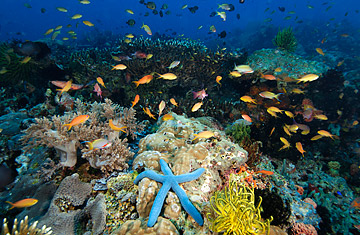
Imagine flying over a section of clear-cut rainforest, somewhere in the Amazon. Even after the bulldozers were gone and the fires had smoked out, you would know that something had happened on this land. You would see the scar that the forest once was, and know that it was wrong.
Now imagine this destruction submerged deep under the ocean — perhaps off the coast of South America, near the remote Galapagos Islands. Flying over the open water, all you would see is clear, blue sea, untouched, not a boat on the horizon. You wouldn't know that beneath the surface, the ocean was hurting — or that humans were the cause.
But human-related injury to the oceans is rife. We have fished out an estimated 90% of the major commercial fish species that swim the high seas, including the giant and endangered blue fin tuna. The trawlers carrying out that destruction are raking the ocean floor, turning parts of the once vibrant continental shelf into so much mud. Climate change is warming the oceans, disrupting the fundamental structure of the marine food pyramid and destroying coral reefs. Meanwhile, increased concentrations of CO2 in the atmosphere are making the seas acidic, which threatens to kill off species in large numbers. "The ocean is becoming a desert," says Jeremy Jackson, the director of the Center for Marine Biodiversity and Conservation at the Scripps Institution of Oceanography.
Pollution that has washed off the land — from sewage that contains chemical toxins to nitrate fertilizer from farmland — has infected the oceans, destroying once vibrant coastal waters. But it's a problem we barely notice, since for many of us the oceans are distant and out of sight. "We are using the oceans as a sewer," says Jean-Michel Cousteau, son of the great French marine explorer and filmmaker, and a documentary maker himself. "But because we're visual creatures and we can't see what's going on, we don't relate."
That ignorance is apparent even in the work of conservationists. Despite the fact that oceans make up nearly 70% of the planet and generate most of the oxygen we breathe, just a fraction of the total philanthropic money donated to green causes finds its way to safeguarding the seas. Today about 12% of the world's land area is under some form of protection, be it a national park, monument or reserve. By contrast 0.8% of the world's oceans are contained within what are called marine protected areas (MPAs), and just a tiny sliver of these areas fall under no-fishing zones. The shelters that do exist are mainly in near-coastal waters, within the 200-mile exclusive economic zones that nations can claim off their shores, but more than half the ocean lies beyond this territory on the high seas, which belong to no single government — a fact that explains in part why comparatively little ocean conservation has been achieved. April 22 may be the 40th anniversary of Earth Day, but it's the oceans that really need our attention now.
